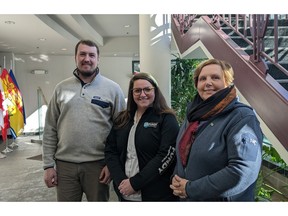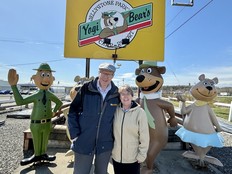Fundy Biosphere Region will operate city's maple sugar camp
Maple sugar camp started 20 years ago with focus on education

Article content
Moncton city council on Monday approved a proposal by the Funday Biosphere Region to take over the city-owned maple sugar camp in Turtle Creek, beginning this season.
Jennifer Dingman, executive director of the UNESCO Fundy Biosphere Reserve, made a presentation to council saying their intention is to get the maple camp back into operation this season, tap the trees, make syrup and provide tours to educate visitors on the process. The camp is next to the Turtle Creek reservoir, the city’s main source of drinking water.
Heather Fraser, a city employee who started the maple sugar camp 22 years ago and ran it until her retirement two years ago, told council that she’s ready to Fundy Bioshpere team get it restarted. In her retirement she continues to do nature education programs. She said the main goal of the camp is education, with the sale of maple products going to play expenses. She said the maple camp at Turtle Creek is near the main road and has a parking lot, which makes it an ideal place to host bus tours of students, seniors and others.
“In 1998-99 was the one who discovered the old sugar camp from the 1960s when we were building a forest road and had the idea to tap some trees with pails and we boiled it in the garage,” Fraser said. She approached council with a business plan to tap 1,500 trees and gradually increased to over 2,000 trees. She said there is potential to tap up to 10,000 trees, but it needs ongoing work.
As it grew, the camp attracted thousands of visitors each year for the experience and education program. Some other privately-owned camps in the Moncton region host pancake breakfasts and sell bottled syrup and other maple products in late March and early April.
“We learned how to make syrup and make it well, and it became a self-financing business so money could go back into it for the next year,” Fraser said. She said the facility was about educating people about protecting the watershed, the importance of forest management, protecting the water and buying local products.
She retired two years ago and the camp has been dormant until this season, as the Fundy Biosphere plans to take it over with the same goals and emphasis on conservation.
“Our intention is to continue on that history of education, but also continue of not competing with other organizations,” Dingman said. The education will include references to how the First Nations people discovered maple syrup and passed the knowledge on to European settlers.
“Since the land is in the area where we get our drinking water, it will also be a chance to talk about healthy forests, healthy water supplies and healthy communities,” she said. The terms of the partnership agreement state that the Fundy Biosphere would pay the city an annual fee to operate the facility.
The maple harvest season usually begins in mid to late March when the temperature rises for the trees to start processing the water around their roots. The season usually lasts about six weeks.
She said the partnership with the city would allow the Fundy Biosphere to promote its environmental work. The non-profit organization is involved in conservation management, sustainable development educational outreach programs, cleanup programs at beaches and trails and tree planting.
The agreement will continue until 2026 when it will be re-evaluated.











Postmedia is committed to maintaining a lively but civil forum for discussion. Please keep comments relevant and respectful. Comments may take up to an hour to appear on the site. You will receive an email if there is a reply to your comment, an update to a thread you follow or if a user you follow comments. Visit our Community Guidelines for more information.